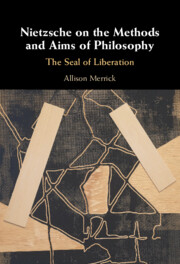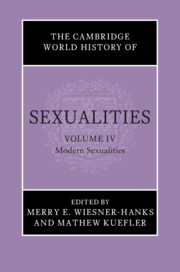Refine search
Actions for selected content:
46 results
4 - Decolonization as Transformation
- from Part I - Activists, Intellectuals, and Movements
-
-
- Book:
- Anticolonialism and Social Thought
- Published online:
- 16 September 2025
- Print publication:
- 25 September 2025, pp 91-114
-
- Chapter
- Export citation
Chapter 7 - Laugh No Limit
- from Part II - Interpretation and Meaning
-
-
- Book:
- The Cambridge Companion to Stand-Up Comedy
- Published online:
- 21 August 2025
- Print publication:
- 04 September 2025, pp 140-157
-
- Chapter
- Export citation
Introduction
-
- Book:
- Nietzsche on the Methods and Aims of Philosophy
- Published online:
- 25 July 2025
- Print publication:
- 14 August 2025, pp 1-13
-
- Chapter
- Export citation

Nietzsche on the Methods and Aims of Philosophy
- The Seal of Liberation
-
- Published online:
- 25 July 2025
- Print publication:
- 14 August 2025
Chapter 13 - Migration
- from Part II - Social Contexts
-
-
- Book:
- Sean O'Casey in Context
- Published online:
- 23 June 2025
- Print publication:
- 10 July 2025, pp 140-149
-
- Chapter
- Export citation
Conclusion
-
- Book:
- Selling Sexual Knowledge
- Published online:
- 24 June 2025
- Print publication:
- 10 July 2025, pp 244-249
-
- Chapter
-
- You have access
- Open access
- HTML
- Export citation
Critical Theory Needs Decolonization and Neo-Vedanta May Hold the Key
- Part of
-
- Journal:
- Public Humanities / Volume 1 / 2025
- Published online by Cambridge University Press:
- 02 May 2025, e94
-
- Article
-
- You have access
- Open access
- HTML
- Export citation
Chapter 4 - Moral Norms
-
- Book:
- The Quest for Individual Freedom
- Published online:
- 12 April 2025
- Print publication:
- 10 April 2025, pp 141-181
-
- Chapter
- Export citation
Conclusion
-
- Book:
- New Sudans
- Published online:
- 06 February 2025
- Print publication:
- 13 February 2025, pp 305-309
-
- Chapter
- Export citation
Chapter 1 - Occupation
-
- Book:
- The Quislings
- Published online:
- 12 December 2024
- Print publication:
- 19 December 2024, pp 26-78
-
- Chapter
- Export citation
5 - Rethinking the Monopoly of Radical Nationalism (1946–1958)
-
- Book:
- Cosmopolitan Nationalism in Ghana
- Published online:
- 12 December 2024
- Print publication:
- 19 December 2024, pp 202-251
-
- Chapter
- Export citation
Chapter 2 - Transition
-
- Book:
- The Quislings
- Published online:
- 12 December 2024
- Print publication:
- 19 December 2024, pp 79-109
-
- Chapter
- Export citation
11 - Black Theology × Artificial Intelligence
- from Part II - Social and Moral Issues
-
-
- Book:
- The Cambridge Companion to Religion and Artificial Intelligence
- Published online:
- 20 November 2024
- Print publication:
- 21 November 2024, pp 182-200
-
- Chapter
- Export citation

The Cambridge World History of Sexualities
-
- Published online:
- 26 April 2024
- Print publication:
- 16 May 2024
Chapter 4 - The Freedom of the Greeks
-
- Book:
- Sparta and the Commemoration of War
- Published online:
- 08 December 2023
- Print publication:
- 21 December 2023, pp 100-141
-
- Chapter
- Export citation
Chapter 6 - Agesilaus, First King of Greece
-
- Book:
- Sparta and the Commemoration of War
- Published online:
- 08 December 2023
- Print publication:
- 21 December 2023, pp 171-196
-
- Chapter
- Export citation
Life at the Margins: Religious Minorities, Status, and the State
-
- Journal:
- Journal of Law and Religion / Volume 38 / Issue 3 / September 2023
- Published online by Cambridge University Press:
- 13 December 2023, pp. 469-484
-
- Article
- Export citation
9 - Conceptualizing Adolescents’ Daily Critical Consciousness
- from Part II - Measurement
-
-
- Book:
- Critical Consciousness
- Published online:
- 20 April 2023
- Print publication:
- 27 April 2023, pp 228-252
-
- Chapter
- Export citation
6 - Giorgio Amendola and a National Road to Socialism and the End of History
-
- Book:
- Politics, Murder and Love in an Italian Family
- Published online:
- 13 January 2023
- Print publication:
- 09 February 2023, pp 152-186
-
- Chapter
- Export citation
10 - Liberationist Interpretation
- from Part II - Frameworks/Stances
-
-
- Book:
- The New Cambridge Companion to Biblical Interpretation
- Published online:
- 15 October 2022
- Print publication:
- 22 December 2022, pp 191-209
-
- Chapter
- Export citation
